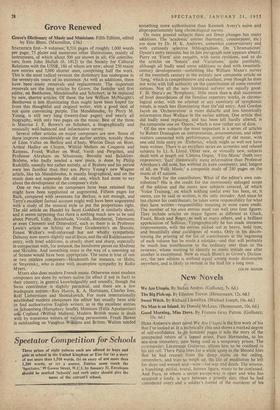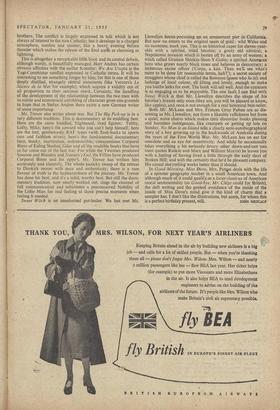New Novels A
We Are Utopia. By Stefan Andres. (Gollancz, 7s. 6d.) Good Morning, Miss Dove. By Frances Gray Patton. (Gollancz, • 10s. 6d.)
HERR ANDRES'S short novel We Are Utopia is the first work of his that I've looked at. It is technically able and shows a marked degree of self-confidence. In its hundred pages it tells the story of the unexpected return of a lapsed priest, Paco Hernandes,. to his one-time monastery, now being used as a temporary prison. The commander, Lieutenant Gutierrez, allows him to be confined in his old cell. There Pico lives for a while again in the Blessed Isles that he had created from the damp stains on the ceiling, remembers, and tries• to weigh up, the life of meditation he left for ships and women and—now—for war and death. The tenente, a bumbling-, pitiful, brutal, human figure, wants to be confessed. And Paco, to whom a secret escape-way is open and who has acquired a knife, is torn between a priestly duty (that he had considered over) and a soldier's hatred of the murderer of his
brothers. The conflict is largely expressed in talk which is not always of interest to the non-Catholic; but it develops in a charged atmosphere, sombre and sinister, like a heavy evening before thunder which makes the release of the final scene as cleansing as lightning.
This is altogether a remarkable little book and its central debate, although wordy, is beautifully managed. Herr Andres has certain obvious affinities with the earlier Koestler; We Are Utopia is the Yogi-Commissar conflict expressed in Catholic terms. It will be interesting to see something longer by him; for this is one of those deeply distilled, strangely central statements (like Vercors's Le Silence de la Mer for example), which acquire a validity out of all proportion to their intrinsic merit. Certainly, the handling of the development of the relationship between the two men with its subtle and economical unfolding of character gives one grounds to hope that in Stefan Andres there exists a new German writer of some importanc,e. • Mr. Trevor also writes about war. But The Big Pick-up is in a very different tradition. This is documentary at its middling best. Here are the same huddled, frightened, tired figures : Tubby, Lofty, Mike; here's the coward who just can't help himself; here are the lost, gentlemanly RAF types (with flash-backs to sports cars and faithless wives); here's the fundamental documentary hero, ttocky, inarticulate, indestructible, conscientious Corporal Binns of Ealing Studios, Giles and all the readable books that have so far come out of the last war. For while the Twenties produced Sassoon and Blunden and Journey's End, the Fifties have produced Corporal Binns and his oppo's. Mr. Trevor has written him accurately and sincerely. The whole panicky sweep of the retreat to Dunkirk moves with pace and authenticity; there is a rare flavour of truth in the haphazardness of the journey. Mr. Trevor has done his best; and it's a solid, worthy best. But still the docu- mentary tradition, now nearly worked out, clogs the channel of full communication and substitutes a preconceived Nobility of the Little Man for real feeling at those precise moments when feeling N needed.
Sweet Witch is an unashamed pot-boiler. We last met Mr. Llewellyn hocus-pocussing on an amusement pier in California, But now we return to the original seam of gold : wild Wales and no nonsense, mark you. This is an historical caper for eleven-year- olds with a spirited, titled heroine; a gouty old admiral; a Napoleonic invasion which is beaten off by an army of women; a witch called Grannie Shinkin-Shon-Y-Gatto; a spirited American hero who grows nearly black roses and believes in democracy; a lecherous excise officer ('Come, a kiss. Then we'll see what's more to be done for reasonable terms, hah?'); a secret society of smugglers whose chief is called the Bowman (guess who he is); and lashings of local colour, all lilting and lovely, enough to make you loathe leeks for ever. The book will sell well. And the cynicism is so engaging as to be enjoyable. The one fault I can find with Sweet Witch is that Mr. Llewellyn describes the shape of his heroine's breasts only once (they are, you will be pleased to know, like apples); and once is not enough for a real historical best-seller.
Both Mr. McLean and Mrs. Frances Gray Patton are as dis- arming as Mr. Llewellyn; not from a likeable raffishness but from a quiet, naive charm which makes their dissimilar books pleasing and harmless indulgences, like crumpets or getting up late on Sunday. No Man is an Island tells a clearly semi-autobiographical story of a boy growing up in the backwoods of Australia during the years of the First World War. Mr. McLean has an ear for anecdote and an eye for eccentricity. And while he occasionally takes everything a bit seriously (every other down-and-out you meet quotes Ruskin and Marx and William Morris) he leaves you with a ,feeling of having lived a little through the early days of Broken Hill; and with the certainty that he'd be pleasant company. His casual storytelling works better than it should.
' In Good Morning, Miss Dove, Mrs. Patton deals with the life of a spinster geography teacher in a small American town. And although much of it could qualify.as a locus classicus of American moral sentimentality (as Good-bye, Mr. Chips could for British), the deft writing and the genteel avoidance of the inside of the inside of Miss Dove's mind give it the kind of charm that a sampler has. I don't like the illustrations, but aunts, for whom this is a perfect birthday present, Will. JOHN METCALF



































 Previous page
Previous page